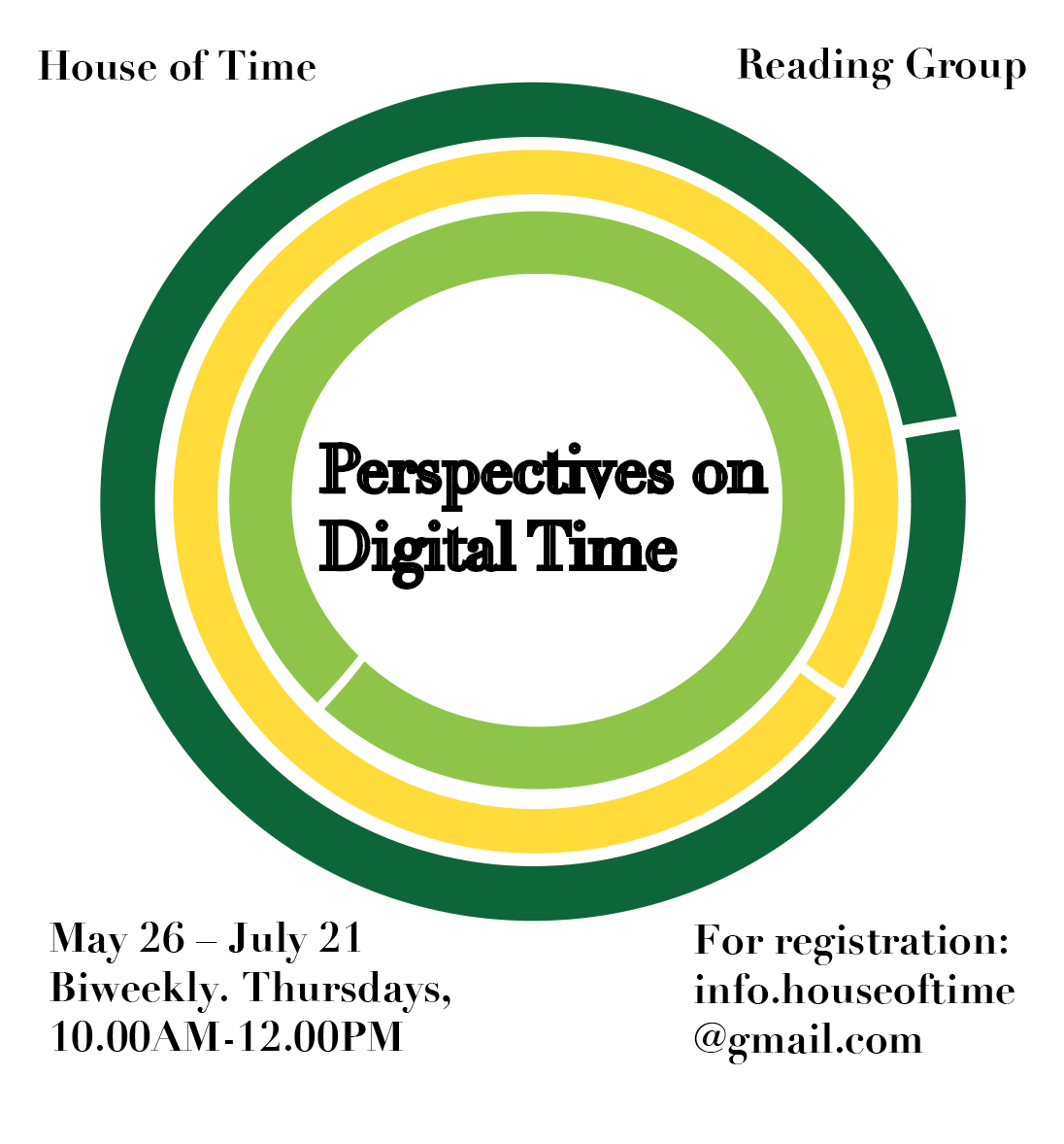Perspectives on Digital Time
HoT Reading Group: May 26 – July 21. Biweekly, Thursdays, 10.00 AM-12.00 PM (EDT). Email info.houseoftime@gmail.com to join.

Digital technology manifests its unique power in organizing flows of time through new forms, e.g., algorithmic timelines, short Stories. From the financialization of economy that thrives on uncertainty (Martin, 2013; Lee & Martin, 2016) to the primacy of distributed measure of affect (Clough, 2018), a new non-universal time is unfolding.
Algorithmic overcoding of narrative time on social media timelines is accompanied with strong reliance on embodied memory for ongoing production of data. Then, new forms of time have two faces —one alien and one familiar, one celestial and one worldly (Heidegger, 2001, 147-149). Based on this fundamental problematization of the contemporary forms of time (Issevenler, 2022), this reading group will analyze a series of perspectives on the temporality of digital culture in 5 interrelated sessions.
Sessions are open to the public; they will take place biweekly and online starting in May 26 and ending in July 21. If interested, please email to info.houseoftime@gmail.com to receive the readings and the zoom links.
The readings are drawn from philosophy, sociology, literature, film theory and critical media studies. At the beginning of each meeting, the organizer will provide the context and suggest possible directions that the discussions may follow. The reading list is brought together (1) to argue that contemporary relations of power evolve on the grounds of technical investment in temporality (2) to develop receptivity towards abundant occasions that allow creative transfiguration of time (3) to think beyond flat notions of acceleration and lay bare different modes of repetition and return (4) to start conversations whereby given cultural and political modes of orientation can be reevaluated from the perspective of unfolding forms of time.
Sessions are going to be approached as workshops. Participants are encouraged to take active role in proposing sections and directions for group-work. Continuous attendance is not required; participants can attend any number of meetings. All readings will be provided as pdfs.
Reading Schedule
Part 1 – May 26 — Punctuations of Flow: the Question of Style
Maurice Blanchot (1968/1997) “Marx’s three voices”. In Friendship.
Fredrich Jameson (1961) “The Rhythm of Time”. In Sartre: Origins of style. 40-63.
Friedrich Nietzsche (1888/1999) Ecce Homo: How to Become What you Are. 103 – 105.
Item: Time-based digital work: (2020-) No Context House MD https://www.instagram.com/nocontexthousemd/
Part 2 – June 9 — Political Economy of Technologies of Flow
Patricia Ticineto Clough (2000) “Generalized Unconscious of Desiring Production”. In Autoaffection: Unconscious Thought in the Age of Teletechnology. 91 – 107.
Patricia Ticineto Clough and Craig Willse (2018) “Gendered Security / National Security: Political Branding and Population Racism” in The User Unconscious: On Affect, Media and Measure.
Part 3 – June 23 — Time, Power and Historico-technical Subjectivity
Friedrich Nietzsche (1888/1997) “Foreword”,” ‘Reason’ in Philosophy”. In Twilight of the Idols Or, How to Philosophize with the Hammer. Hackett.
— (1885-1888/1968) The Will to Power. (Ed. Walter Kauffman). Note number: 12, 29, 51, 57, 617, 718, 719.
Gilles Deleuze (1989) “Peaks of present and sheets of past. Forth commentary on Bergson” and “Powers of False” In Cinema 2: Time-Image.
Part 4 – July 7 — Material Distribution of Narrative Flow
Michael Goddard (2016) Telephones, Voice Recorders, Microphones, Phonographs: A Media Archaeology of Sonic Technologies in Twin Peaks. Sense of Cinema.
Kara Keeling (2019) “Intercession. The De-American Bartleby Archipelagoes, Refusal, and the Cosmic”. In Queer Times, Black Futures.
Wolfgang Ernst (2021) “Existing in Discrete States: On the Techno-Aesthetics of Algorithmic Being-in-Time”. Theory, Culture & Society.
Part 5 – July 21 —Discontinuity in Flow
Martin Heidegger (1938/1977) “The Age of World Picture”. In The Question Concerning Technology and other essays, Harper.
Gilles Deleuze (1981/2002) Francis Bacon: The Logic of Sensation. 86-98.
Luciana Parisi (2013) “Soft temporalities”. In Contagious Architecture: Computation, Aesthetics and Space. 107-135.
Works cited in the description
Clough, P. T. (2018). The user unconscious: On affect, media, and measure. University of Minnesota Press.
Heidegger, M. (2001) “Building dwelling thinking”. In Poetry, Language and Thought.
Issevenler, T. (2022). Time and power: The will to temporalize in digital culture. Manuscript unpublished.
Lee, B., & Martin, R. (Eds.). (2016). Derivatives and the wealth of societies. University of Chicago Press.
Martin, R. (2013). After economy? Social logics of the derivative. Social Text, 31(1), 83-106.
